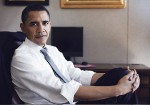Political underdogs come out on top

American voters might support Democratic presidential nominee Barack Obama because he’s considered an underdog, according to USF researchers.
Social psychology professor Joseph Vandello and USF graduate Nadav Goldschmied researched how voters react to political underdogs — defined as those at a disadvantage — and found that people favor candidates with the label.
“What we found is that people tend to root for, sympathize with and support groups or individuals … that they see as having some type of disadvantage or see them as underdogs,” Vandello said. “There seems to be a fundamental human motivation to support underdogs.”
To see whether people favored underdogs, Vandello and Goldschmied presented focus groups with sports scenarios, political speeches or essays regarding international issues to gauge how the term “underdog” affected the groups’ opinions.
In one study, a group of people read a doctored speech that they were told was written by Obama. Vandello and Goldschmied gave half the group a speech containing a passage stating, “I know I am an underdog at this time,” while the other half read a speech with the passage, “I am the front-runner at this time.”
When asked to rate the speeches in the areas of warmth and friendliness, Vandello said, those who read the speech with the underdog passage ranked Obama as significantly more likeable.
Vandello said that the underdog label seemed to matter more to Democrats. They were significantly more likely to vote for the candidate labeled as the political underdog, while Republicans were not more likely to vote based on this label, he said.
Being labeled the underdog, Vandello said, can be a positive thing.
“Politicians can use that as an advantage to portray themselves as someone who has risen out of nowhere,” he said.
Political science professor Susan MacManus said that, in many cases, politicians would rather be described as an underdog than a front-runner.
“Underdog status, particularly in a close state, often brings in higher voter turnout because people think their vote is going to count,” she said.
Jonathan Geary, chairman of USF College Republicans, thinks that underdog status benefited Obama in the early stages of the campaigns, but could hurt him now.
“Obama peaked too early,” he said. “Earlier in the year when he was beating Hillary (Clinton), everyone just hopped on the train — the Obama train.”
Since Obama has become the front-runner, Geary said, Republican presidential nominee John McCain could be seen as the underdog. People are paying more attention, he said, to what McCain has to offer.
Vandello said that once a candidate loses his underdog status and becomes a front-runner, it’s harder to maintain likeability.
“The implications of all this is that it is very difficult to maintain your momentum in a long campaign like we’re seeing right now,” Vandello said. “Obama got all his momentum because he was labeled the underdog early.”






